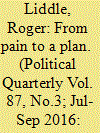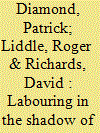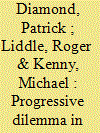| Srl | Item |
| 1 |
ID:
149217


|
|
|
| 2 |
ID:
138271


|
|
|
|
|
| Summary/Abstract |
The British state is in flux and the Labour party is struggling to shape an effective response to the politics of disunification. This article reflects on the nature of Labour's governing project and its conception of modern statecraft which has evolved since the party became a serious contender for power in the aftermath of the First World War. We argue that Labour's initially pluralising instincts cultivated in opposition have been checked by the ongoing reality of a state-centric mode of governing, in which the party continued to robustly defend the Westminster model operating within the parameters established by the British Political Tradition (BPT). Ed Miliband's conception of ‘One Nation’ Labour threatens to reinforce this historical pattern of reversion to the Westminster model, at precisely the moment when devolutionary forces are destabilising the existing political settlement. To break out of this impasse, Labour must look elsewhere in its ideological lexicon for inspiration, chiefly to the tradition of socialist pluralism and associationalism.
|
|
|
|
|
|
|
|
|
|
|
|
|
|
|
|
| 3 |
ID:
152548


|
|
|
|
|
| Summary/Abstract |
This special edition reflects on the contemporary relevance of the insights and concerns of David Marquand's book The Progressive Dilemma. In this Introduction, the editors set the scene for these reflections. They consider the structural changes that have occurred in politics since the 1990s: the impact of globalisation, the erosion of class identities, the rise of ‘identity politics’ and the continued fragmentation of the party system. There has been no reconciliation between the parties of the centre-left, nor any re-examination of the ‘liberal tradition’ and the potential for a new synthesis with revisionist social democracy. On the one hand, Corbynism is a radicalised metropolitan species of liberalism, while on the other there are plenty in Labour who stress the need for the party to re-engage with the traditional, socially conservative values of the working class in a new ‘postliberal’ appeal. Yet the authors argue that those who broadly identify with progressive causes in British politics—animated by the various overlapping strands of social liberalism, social democracy and liberal socialism—have still to work out how to address the historic failings that Marquand so eloquently exposed, to create a new and inspiring intellectual vision that unites and energises the left and centre-left.
|
|
|
|
|
|
|
|
|
|
|
|
|
|
|
|
| 4 |
ID:
152560


|
|
|
|
|
| Summary/Abstract |
Jeremy Corbyn's election and re-election as Labour leader, together with the emergence of a new Conservative Prime Minister committed to Brexit, has led to renewed speculation about the possibility of a new party appealing to the ‘politically homeless’ in the centre and centre-left of British politics. This article draws lessons from the SDP experience in the early 1980s. Are the structural conditions more favourable to the progressive centre-left now than they were then? Is there the sociological, electoral and ideological space for a new party? Does first past the post remain an insuperable barrier to an electoral breakthrough? From whom and in what circumstances might the leadership for a new party come? For all the depth of Labour's current problems, a new party seems an unlikely immediate prospect. In 1981, the SDP made a major miscalculation about the irreversibility of Labour's decline. However, the process of fragmentation in British politics seems set to continue.
|
|
|
|
|
|
|
|
|
|
|
|
|
|
|
|